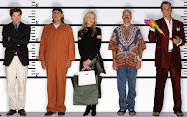
Over the weekend, my friend Adam and I went to see the film Coraline, a stop-animation children's fantasy based on a book by science-fiction/fantasy author Neil Gaiman. Visually, the film is amazing -- better, I think, than either The Corpse Bride or The Nightmare Before Christmas. (I can say this because Coraline is made by the same team -- Laika -- headed by director Henry Selick. It's not a comparison of artistic genius, but more of a comment on how stop-animation has evolved and survived in this world that is so reliant on CGI effects.) In fact, the opening title sequence may be my favorite part; we see a doll being ripped apart and then sewn into the Coraline doll that follows our protagonist throughout the narrative. It's slightly creepy because we only see the machine-like hands of the sewer, but it's also kind of whimsical in the way that the doll is constructed and then sent out the window.
The basic plotline of the film is this: A young girl, Coraline (not Carolyn or Caroline!), moves into a new house with her dismissive and boring parents. They would rather write a book on gardening than pay any attention to their daughter. One night, Coraline finds a secret passage into an alternate world where her "other mother" is nurturing and kind, knows how to cook, and plants a garden in her honor. But not everything is as peachy as it seems, and, as the poster warns, be careful what you wish for.

Overall, I enjoyed the film -- at least well enough to recommend it to anyone. The highlights for me included the opening title sequence (in which see machine-like hands sew together a doll in Coraline's likeness), a song by They Might Be Giants (which can be heard in its entirety on iTunes), and Coraline's initial exploration into this alternate world. In one particularly enchanting scene in the alternate realm, Coraline attends a performance by Mrs. Spink and Forcible, the other attendees being their hundreds of dead Scottie dogs in angel costumes. This universe is very inventive, and I found myself envious of a candelabra that dispenses mango milkshakes and a garden of tickling snapdragons. And in an aerial view of the garden, we see that it too is in the likeness of Coraline, where the bridge of a pond because the bridge of Coraline's nose. (Does this repeated image of Coraline mean that this girl is narcissistic? If I were surrounded by a world that was that interested me, I would be completely creeped out.) Perhaps this ambiguous border between seduction and terror is what discomforts me about the movie. This world is supposed to be enticing, but the entire time I'm thinking Get out of there!
Two other things that bothered me: One, during the climax of the film, Coraline goes on a hunt around her "other mother's" house to find the souls of previous children (which is odd in of itself), and it becomes blatantly apparent that they had children's video games in mind. Even the animation changes; not drastically, just in the fluidity and mobility of the camera's movements. As Coraline goes on this hunt, so do we, and it's like we're playing a video game. I didn't find this very appealing because, first, I don't care for video games, and second, if media genres are going to intersect, the hybridity should be seamless. And two, the other thing that bothered me is that there was no strong resolution at the end. Spoiler alert: Her parents don't exactly treat her better. We see them in the garden offering drinks to neighbors, but do we really get a sense that they care about Coraline or will pay any attention to her in the future? I kind of felt like she was trapped in this world of nonexistent love, but that's okay because the alternative is so much worse. Umm...

But for a second opinion, here're some lines from A. O. Scott's review in The New York Times:
Its look and mood may remind adult viewers at various times of the dreamscapes of Tim Burton (with whom Mr. Selick worked on “Nightmare”), Guillermo del Toro and David Lynch. Like those filmmakers Mr. Selick is interested in childhood not as a condition of sentimentalized, passive innocence but rather as an active, seething state of receptivity in which consciousness itself is a site of wondrous, at times unbearable drama.
The governing emotion, at the beginning, is loneliness. A smart, brave girl named Coraline Jones, voiced by Dakota Fanning, has recently moved from Michigan to an apartment in a big pink Victorian house somewhere in Oregon. She is at an age when the inadequacy of her parents starts to become apparent, and Coraline’s stressed-out, self-absorbed mom and dad (Teri Hatcher and John Hodgman), who write about gardening, barely look up from their computer screens when she’s in the room. And so, like many a children’s book heroine before her, Coraline sets out to explore her curious surroundings, interweaving the odd details of everyday reality with the bright threads of imagination.









.jpg)


2 comments:
The biggest change at the end of Coraline was that she learned to appreciate her parents, neighbors, her real life. Her parents didn't need to pay more attention to her.
That certainly makes sense, and I do buy into that to a certain extent. I guess that, with the knowledge that children would be seeing this movie, I don't like the idea that the moral of the story is self-reliance. I certainly don't think children should define themselves or their happiness by how much their parents pay attention to them (these ideas aren't antithetical); but I was hoping that the parents would change because they weren't very good parents.
And if what you're saying is the case -- and it may very well be, I haven't read the book -- then perhaps the "resolution" of the film should have lasted more than a few minutes. Maybe we could have seen Coraline interacting with her neighbors in their own private environments again and see that change in how she appreciates them. I do agree that we get a sense of this with her relationship with Wybie, but I just didn't feel like enough changed at the end -- either change in the situation or change in Coraline's attitude.
But I do appreciate your comment. :)
Post a Comment